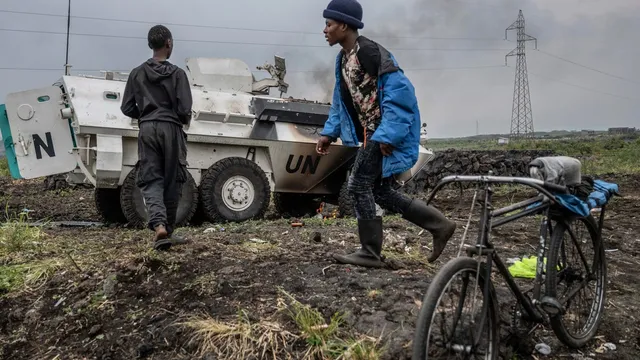
South African soldiers evacuated from Congo amid escalating rebel attacks
2025-02-25 13:24- Critically injured South African peacekeepers were evacuated from the rebel-controlled city of Goma, Congo.
- The evacuation was facilitated by the United Nations following significant injuries experienced by these troops.
- The situation highlights the challenges and scrutiny facing South Africa's peacekeeping efforts amid escalating rebel violence.
Express your sentiment!
Insights
In January 2025, a group of South African peacekeepers sustained critical injuries during violent encounters in eastern Congo, particularly in the rebel-controlled city of Goma. This city has become the focal point of conflict as it has been seized by M23 rebels, supported by Rwandan troops, amidst a resurgence of fighting in the region. The South African National Defense Force reported that these injured soldiers were subsequently airlifted back to South Africa by the United Nations after receiving medical treatment in Goma. The M23 insurgents have been implicated in numerous casualties as their offensive continues to destabilize the area. The ongoing conflict in eastern Congo has been exacerbated by the porous borders and a complex history of militia involvement, which has resulted in significant human suffering, including the reported deaths of thousands. Following their evacuation, more than 100 additional members of the South African contingent are expected to return home in subsequent days. Among those needing urgent medical attention, three soldiers have been highlighted, alongside two pregnant soldiers being repatriated, showcasing the dire circumstances faced by the peacekeepers. The backdrop to this evacuation includes broader scrutiny of South Africa’s involvement in the peacekeeping operations within the region, particularly given the prior casualties suffered in January when 14 soldiers lost their lives in crossfire during confrontations between government troops and M23 rebels. Questions have emerged regarding the adequacy of resources and training provided to these troops, revealing a critical discourse on the responsibility of the national armed forces to protect their personnel in increasingly perilous situations. In light of these developments, the situation in eastern Congo remains precarious, prompting international observers to call for a reevaluation of operational support for peacekeeping missions. With aims to stabilize the region hampered by ongoing conflicts and political uncertainties, the push for operational recommencement at Goma's airport underscores the urgency for humanitarian and security interventions. The conflict not only affects the South African soldiers but also reflects a broader regional instability that could have lasting impacts on international peacekeeping efforts across Africa.
Contexts
The involvement of South Africa in military peacekeeping operations in the Democratic Republic of Congo (DRC) reflects the country's commitment to regional stability and security. Historically, South Africa has taken a proactive role in peacekeeping efforts within the African continent, particularly through its integrated defense forces and collaborative efforts with the United Nations and African Union. The DRC, facing decades of conflict, violence, and humanitarian crises, has seen the need for international intervention, leading South Africa to participate in the United Nations Organization Stabilization Mission in the Democratic Republic of the Congo (MONUSCO) since its inception in 1999. South Africa’s military contributions have been multifaceted, involving logistical support, troop deployment, and training of Congolese forces. The South African National Defence Force (SANDF) has, over the years, sent troops on peacekeeping missions aimed at protecting civilians, ensuring the security of humanitarian assistance, and supporting disarmament processes. The deployment of South African troops has had notable impacts, fostering stability in volatile regions and assisting in the reconciliation process among various factions within the DRC. However, these operations are not without challenges, including attacks from armed groups, issues related to coordination with other military forces, and logistical constraints that affect operational effectiveness. Furthermore, South Africa has played a significant diplomatic role in DRC peace efforts, often acting as a mediator in discussions between the Congolese government and numerous rebel groups. These initiatives underline the importance of addressing the root causes of conflict, including poverty, governance issues, and the control of natural resources. South Africa's involvement has emphasized the need for a comprehensive approach to peacebuilding—one that not only addresses military aspects but also focuses on social, political, and economic development initiatives to foster lasting peace. In conclusion, South Africa’s military peacekeeping operations in Congo highlight the complex interplay between military intervention and sustainable peacebuilding. This dual approach is crucial for addressing immediate security threats while laying the groundwork for long-term stability. Moving forward, the success of these operations will depend on ongoing collaboration with international organizations, effective communication between military and civilian components, and a commitment to upholding human rights in conflict zones. The situation demands continuous evaluation and adaptation of strategies to ensure that the fundamental objectives of peacekeeping are met, ultimately contributing to a secure and stable DRC.